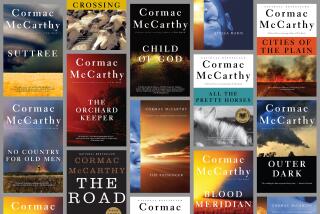The Outer Limits of Small-Town Cuteness
- Share via
In Victor Hugo’s novel “Toilers of the Sea” (1866), a man single-handedly salvages a wrecked steamship to win the hand of the woman he loves. He lives for months on a storm-lashed rock in the English Channel, and she doesn’t think he’s crazy, nor does she consider herself a victim of emotional blackmail. It was a romantic time--the spirit of which Ben Sherwood tries to revive with this tale of a Nebraska farmer who eats a jumbo jet that crash-landed in his cornfield. He, too, does it for love.
Still, there’s a difference--call it the yecch factor--between the useful task of salvaging a ship and the pointless exercise of grinding up chunks of airplane into metal powder and sprinkling it on your Cheerios and cheeseburgers, as Wally Chubb does. Tellingly, the hero of Sherwood’s fable isn’t Wally himself but J.J. Smith, a representative from the Guinness Book of Records who comes to the little town of Superior to verify Wally’s feat.
It can be done, Sherwood assures us. A real-life Frenchman, Michel Lotito, has ingested “nearly nine tons of metal since 1966,” including a four-seater Cessna. Metal is inert and simply passes through the body, if it has no sharp edges. But why Wally should choose this way to express his lifelong passion for Willa Wyatt, local newspaper editor and softball whiz, is another matter. Sherwood explains it, but not convincingly. Clearly, he started with the killer title and made up the rest of the story to fit.
Indeed, the closer you look at it, the more calculating and cynical “The Man Who Ate the 747” appears to be. It panders to the audience that made “Forrest Gump” a bestseller, taking a real town--Superior is on the Republican River, just north of the Kansas line--and fuzzing it into a place of homespun virtue “where folks care about crops, family and faith.”
Sherwood is a senior producer of the “NBC Nightly News,” a member of the same media elite whose values he affects to satirize through his portrait of J.J., who can spout statistics about love (the longest kiss was clocked at 30 hours and 45 minutes in Tel Aviv) and discourse on the brain chemistry of sexual attraction, but knows nothing of love itself--until, he, too, falls for Willa.
Can J.J. overcome his fear of commitment? Can long-limbed, wild-haired, honey-eyed Willa--her name’s a nod to author Willa Cather, who lived in nearby Red Cloud--forget how her heart was broken by another smooth-talking city guy? Can Wally cope if she loves J.J., or will he finally notice Rose, the woman who loves him? Can Shrimp, the Don Knotts-like police chief, gain enough weight to avoid being blown over in high winds? Can Superior weather all the publicity without being spoiled?
More to the point: Can we swallow so much warmth and cuteness as easily as Wally swallows shavings of the 747’s “black box,” or will we gag? J.J. exhorts us: “Believe [this story] just a little--and you may shed some of the armor of ambivalence that shields you from your feelings and leaves you sleepwalking through your days.”
Sometimes, though, ambivalence is called for. Sherwood’s novel is crisply written, well researched and full of amusing world-record trivia. Willa (unlike Wally and J.J.) is an engaging character. But what can you say when J.J., having quit his soulless job, settled in Superior and supposedly realized that the things “that really count,” the “everyday wonders, authentic moments of greatness and splendor,” are “the kind that never end up in books,” sets about soliciting and collecting stories about them--for another book?
More to Read
Sign up for our Book Club newsletter
Get the latest news, events and more from the Los Angeles Times Book Club, and help us get L.A. reading and talking.
You may occasionally receive promotional content from the Los Angeles Times.







